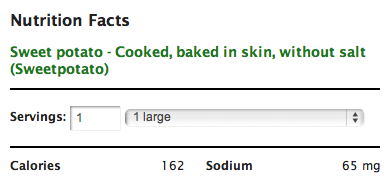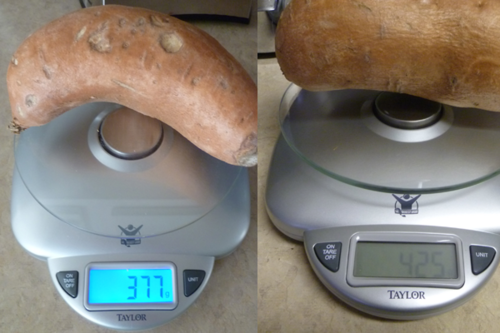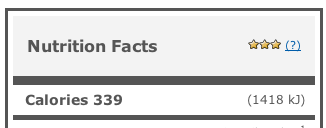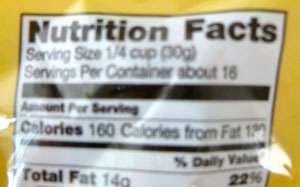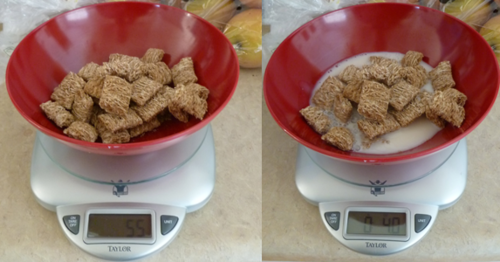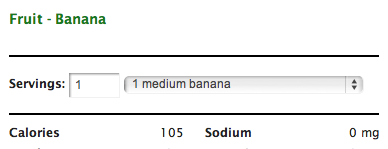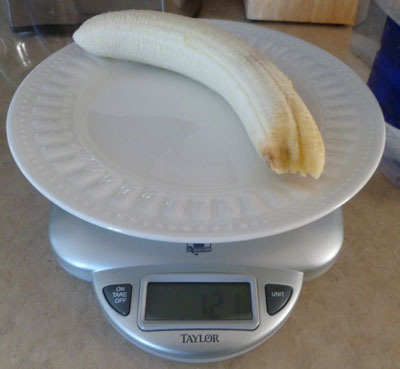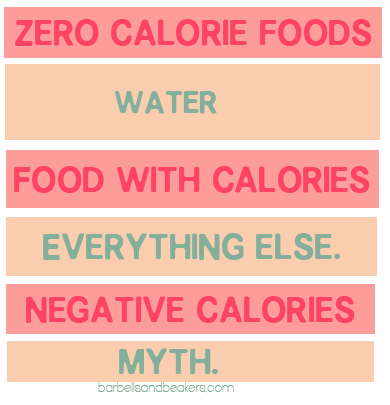This question comes to you from my mother, and a lot of people who send me asks. My mom WAS a yo-yo dieter, and every diet she’d ever been on recommended fruit and vegetables in excess…except some diets swore off “high carb” vegetables. She wanted to know what the deal was with this, so I thought I’d beak it down.
1. There is no such thing as a zero calorie or negative calorie fruit/vegetable/food/etc.
All things have calories. When people say, “Eat all the celery you want, it’s a negative calorie food!” they are wrong. Celery has negligible calories, however, so eating those 5 calories of celery a few times a day isn’t going to set back your weight loss. You gain a pound of weight by eating 3,500 calories over your maintenance calories for the day. This can come from fruit, vegetables, bagels, ice cream, lean meat, etc. One food isn’t going to do you in, the calories will.
2. Why the veggie/fruit free-for-all?
Think about who most diet plans are tailored to: overweight individuals looking to shed 20+ pounds of body fat. Most people who buy into these diet plans/weight loss plans may not have the most balanced meals in the first place. I cannot remember a time growing up when we had fresh spinach for dinner, but rather Cream of Mushroom lathered asparagus that we slugged through together. Most people who go on diet plans don’t eat fruits and veggies in the first place, or they eat one type of fruit (apple) once or twice a week. Giving people “free range” to eat all the fruits and veggies they want will make them fill their gaps of hunger with these cheat foods. Why is this good?
3. Veggies and fruit are super healthy
They pack carbs, fats, protein, micro and macro nutrients in a solid punch. Look at my good food posts – 1 cup of collard greens has almost 400mg of calcium (35 calories)? Artichokes can carry 10 mg of fiber (76 calories)? Carrots are high in vitamin A (52 calories in one cup)? Compared to the calories you’re getting a lot of bang for your buck.
4. It’s harder to OD on calories from veggies/fruit than Honey Buns, bags of chips, etc.
Veggies and fruits come with the solid advantage of being pre-portioned. When you want to eat an apple, you eat one apple. When you want to eat chips, it’s rare that someone portions them out and counts how many chips they eat. When a cup of spinach has 5 calories but a glass of soda can have 160 calories, it makes sense why you’d point someone in the direction of fruits and veggies instead of anything else.
5. “Empty calories” vs. nutritious foods
If you’re filling your hunger void with veggies and fruits instead of diet sodas, chips, etc. there’s an increased likelihood that you’ll be fuller longer. Why? Fiber, protein and healthy fat are touted to keep you fuller longer. Without going into the reasoning behind stretch receptors, signals of hunger, the mental aspect of hunger, we can accept that this is true. Some people will disagree, and that’s fine, no two bodies are the same. In general research shows that if you eat something nutrient dense, like say spinach or an avocado, then the protein, fiber and healthy fat found in it will keep you full longer. Mindless snacking aside, that means less dips into the potato chips in an attempt to fill the void.
So should you count the calories in fruits and vegetables?
Why you shouldn’t
- Your focus is on incorporating healthy food choices into your lifestyle
- You’re lacking in nutrients in a certain department and are trying to supplement that with fruit and vegetables
- Calorie counting and weight loss are not important to you
Why you should
- If you are stalled for weight loss and haven’t been counting calories from fruit/veggies
- You eat fruit/veggies 4-5x a day and are trying to lose weight by counting calories
- You’re interested in learning about portion sizes and want to be able to eyeball what a standard carrot size is, and what that means calorie wise
It’s a complex issue that’s highly individualized. Fruits and veggies are wonderful food that can add lots of micro and macro nutrients to your diet. No one single food group is causing you to gain weight or not lose weight, it’s the excess calories from your overall eating that is doing this. As long as you know your goals you should be able to answer this question for yourself.
